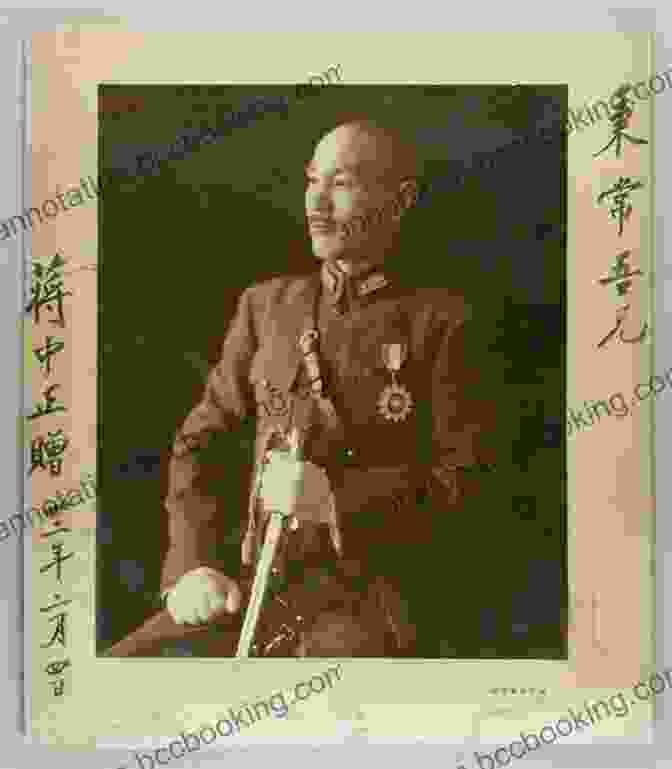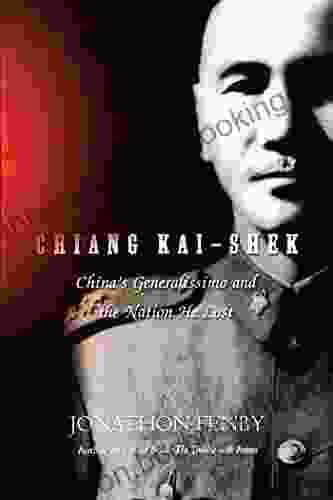China Generalissimo and the Nation He Lost

In the annals of Chinese history, few figures loom as large and enigmatic as Chiang Kai-shek. As the Generalissimo of the Nationalist forces, he led China through a tumultuous era of civil war and foreign invasion, only to ultimately lose the nation he had fought so valiantly to unite.
4.4 out of 5
| Language | : | English |
| File size | : | 13471 KB |
| Text-to-Speech | : | Enabled |
| Screen Reader | : | Supported |
| Enhanced typesetting | : | Enabled |
| X-Ray | : | Enabled |
| Word Wise | : | Enabled |
| Print length | : | 622 pages |
In this gripping narrative, we delve into the life and legacy of this complex and controversial figure. Through meticulous research and vivid prose, we uncover the motivations, strategies, and fateful decisions that shaped Chiang's trajectory and ultimately led to his downfall.
A Rising Star

Born in 1887 into a humble family, Chiang Kai-shek rose through the ranks of the Chinese military with remarkable speed and determination. In the early 20th century, China was plagued by instability and foreign intervention, and Chiang emerged as a charismatic and ambitious leader with a vision for a united and prosperous nation.
In 1926, Chiang became the leader of the Kuomintang (Nationalist Party),the dominant political force in China at the time. With the backing of the party and the military, Chiang launched a series of campaigns to unify the country and expel foreign powers.
The Road to Nanjing
Chiang's military prowess and political cunning proved successful in many respects. He defeated regional warlords, expanded the authority of the Nationalist government, and even managed to broker an agreement with the Chinese Communist Party to form a united front against Japanese aggression.
In 1928, Chiang's forces captured Beijing, the former imperial capital of China. The victory was a major turning point, signaling the establishment of a new Nationalist government in Nanjing. Chiang became the President of the Republic of China, the first leader to unite China under a single government since the fall of the Qing dynasty.
The Japanese Invasion
However, Chiang's triumph was short-lived. In 1931, Japan invaded Manchuria, a region in northeastern China. The invasion marked the beginning of a long and brutal war between China and Japan that would have a profound impact on Chiang's life and legacy.
Chiang's response to the Japanese aggression was cautious and hesitant. He feared that a direct confrontation with Japan would weaken China further and jeopardize his efforts to unify the country. As a result, he pursued a policy of appeasement, conceding territory to Japan in the hope of avoiding a full-scale war.
The Battle for Survival
Despite Chiang's efforts, Japan's aggression continued unabated. In 1937, the Japanese launched a full-scale invasion of China. Chiang and his forces were forced to retreat inland, abandoning major cities and industrial centers.
During the war, Chiang faced immense challenges from both the Japanese and the Chinese Communist Party. The Communists, led by Mao Zedong, saw the war as an opportunity to expand their influence and challenge Chiang's leadership.
Chiang's military strategy shifted from conventional warfare to guerrilla tactics. He used his knowledge of the Chinese countryside to launch hit-and-run attacks against the Japanese, while also trying to contain the Communist forces.
Civil War and Defeat
As the war against Japan dragged on, tensions between the Nationalists and the Communists escalated. In 1945, after Japan's surrender, China erupted in a civil war between the two factions.
Despite receiving aid from the United States, Chiang's forces were outmatched by the Communist army. The Communists had a stronger political base in the countryside and were able to mobilize a larger and more motivated force.
In 1949, the Communist forces captured Beijing and proclaimed the establishment of the People's Republic of China. Chiang and his remaining forces fled to Taiwan, where they established a separate government.
Legacy and Legacy
Chiang Kai-shek remained the leader of the Republic of China on Taiwan until his death in 1975. He never renounced his claim to mainland China and continued to hope for a return to power.
Chiang's legacy is a complex and controversial one. He was a charismatic leader who united China under his command but also made fateful decisions that contributed to his downfall. His authoritarian rule and suppression of political dissent alienated many Chinese, and his military strategies against Japan and the Communists have been criticized by historians.
However, Chiang's role in Chinese history cannot be underestimated. He was a key player in the tumultuous events of the 20th century, and his legacy continues to shape China's politics and international relations to this day.
The story of China Generalissimo Chiang Kai-shek is a tale of ambition, triumph, and loss. It is a story that sheds light on the complexities of Chinese history and the enduring impact of individual choices on the fate of nations.
Whether hailed as a hero or reviled as a dictator, Chiang Kai-shek remains an enigmatic figure whose legacy continues to be debated and studied by historians and political scientists alike.
4.4 out of 5
| Language | : | English |
| File size | : | 13471 KB |
| Text-to-Speech | : | Enabled |
| Screen Reader | : | Supported |
| Enhanced typesetting | : | Enabled |
| X-Ray | : | Enabled |
| Word Wise | : | Enabled |
| Print length | : | 622 pages |
Do you want to contribute by writing guest posts on this blog?
Please contact us and send us a resume of previous articles that you have written.
 Book
Book Novel
Novel Page
Page Chapter
Chapter Text
Text Story
Story Genre
Genre Reader
Reader Library
Library Paperback
Paperback E-book
E-book Magazine
Magazine Newspaper
Newspaper Paragraph
Paragraph Sentence
Sentence Bookmark
Bookmark Shelf
Shelf Glossary
Glossary Bibliography
Bibliography Foreword
Foreword Preface
Preface Synopsis
Synopsis Annotation
Annotation Footnote
Footnote Manuscript
Manuscript Scroll
Scroll Codex
Codex Tome
Tome Bestseller
Bestseller Classics
Classics Library card
Library card Narrative
Narrative Biography
Biography Autobiography
Autobiography Memoir
Memoir Reference
Reference Encyclopedia
Encyclopedia Cindy Entin
Cindy Entin Gary Kinder
Gary Kinder Garance Dore
Garance Dore Gretchen Davis
Gretchen Davis Richard White
Richard White Ross Terrill
Ross Terrill Mindy Lighthipe
Mindy Lighthipe Mark Jackson
Mark Jackson Paul Dini
Paul Dini Katie Willis
Katie Willis Gail Geo Holmes
Gail Geo Holmes Steven Brindle
Steven Brindle Michael Taylor
Michael Taylor Gail Jarrow
Gail Jarrow Michelle Garnett
Michelle Garnett Michel Crouhy
Michel Crouhy Jason Lee
Jason Lee G Bruce Knecht
G Bruce Knecht Lakshya Trivedi
Lakshya Trivedi Vaughn Heppner
Vaughn Heppner
Light bulbAdvertise smarter! Our strategic ad space ensures maximum exposure. Reserve your spot today!
 Jesse BellFollow ·4.1k
Jesse BellFollow ·4.1k Jackson HayesFollow ·19.8k
Jackson HayesFollow ·19.8k Drew BellFollow ·6.6k
Drew BellFollow ·6.6k Dalton FosterFollow ·18.9k
Dalton FosterFollow ·18.9k Harry CookFollow ·12k
Harry CookFollow ·12k Doug PriceFollow ·16.6k
Doug PriceFollow ·16.6k Chuck MitchellFollow ·10.2k
Chuck MitchellFollow ·10.2k Jack LondonFollow ·3.7k
Jack LondonFollow ·3.7k

 Voltaire
VoltaireStories From The Jim Crow Museum: Unveiling the Haunting...
A Journey into the Depths of...

 F. Scott Fitzgerald
F. Scott FitzgeraldCalling Sorcery And Society: Illuminating the...
: The Alluring Embrace of Sorcery ...

 Marcel Proust
Marcel ProustBranding Bud: Unveiling the Green Rush
As the legalization...

 Henry Wadsworth Longfellow
Henry Wadsworth LongfellowColorful Dreamer: The Story of Artist Henri Matisse
Henri Matisse was a French artist...

 Adrian Ward
Adrian WardDelving into the Tapestry of Black British Identity: A...
In the realm of historical...
4.4 out of 5
| Language | : | English |
| File size | : | 13471 KB |
| Text-to-Speech | : | Enabled |
| Screen Reader | : | Supported |
| Enhanced typesetting | : | Enabled |
| X-Ray | : | Enabled |
| Word Wise | : | Enabled |
| Print length | : | 622 pages |














